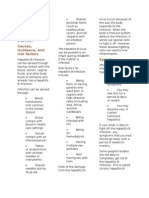0 ratings0% found this document useful (0 votes)
11 viewsHepatitis
Hepatitis
Uploaded by
luvvemulleHepatitis is an inflammation of the liver that can be caused by viruses or toxic substances. There are multiple types of hepatitis defined by their causes, which include hepatitis A, B, C, D, and E viruses. Symptoms range from mild fatigue and abdominal discomfort to jaundice. Diagnosis involves liver enzyme and bilirubin blood tests, ultrasound imaging, and viral antibody testing. Treatment focuses on relieving symptoms for acute cases and antiviral drugs for chronic cases. Complications can include cirrhosis, liver failure, and liver cancer if left untreated. Prevention methods center around vaccination, hand washing, and avoiding sharing personal items that may transmit bodily fluids.
Copyright:
© All Rights Reserved
Available Formats
Download as DOC, PDF, TXT or read online from Scribd
Hepatitis
Hepatitis
Uploaded by
luvvemulle0 ratings0% found this document useful (0 votes)
11 views2 pagesHepatitis is an inflammation of the liver that can be caused by viruses or toxic substances. There are multiple types of hepatitis defined by their causes, which include hepatitis A, B, C, D, and E viruses. Symptoms range from mild fatigue and abdominal discomfort to jaundice. Diagnosis involves liver enzyme and bilirubin blood tests, ultrasound imaging, and viral antibody testing. Treatment focuses on relieving symptoms for acute cases and antiviral drugs for chronic cases. Complications can include cirrhosis, liver failure, and liver cancer if left untreated. Prevention methods center around vaccination, hand washing, and avoiding sharing personal items that may transmit bodily fluids.
Original Title
Hepatitis (2)
Copyright
© © All Rights Reserved
Available Formats
DOC, PDF, TXT or read online from Scribd
Share this document
Did you find this document useful?
Is this content inappropriate?
Hepatitis is an inflammation of the liver that can be caused by viruses or toxic substances. There are multiple types of hepatitis defined by their causes, which include hepatitis A, B, C, D, and E viruses. Symptoms range from mild fatigue and abdominal discomfort to jaundice. Diagnosis involves liver enzyme and bilirubin blood tests, ultrasound imaging, and viral antibody testing. Treatment focuses on relieving symptoms for acute cases and antiviral drugs for chronic cases. Complications can include cirrhosis, liver failure, and liver cancer if left untreated. Prevention methods center around vaccination, hand washing, and avoiding sharing personal items that may transmit bodily fluids.
Copyright:
© All Rights Reserved
Available Formats
Download as DOC, PDF, TXT or read online from Scribd
Download as doc, pdf, or txt
0 ratings0% found this document useful (0 votes)
11 views2 pagesHepatitis
Hepatitis
Uploaded by
luvvemulleHepatitis is an inflammation of the liver that can be caused by viruses or toxic substances. There are multiple types of hepatitis defined by their causes, which include hepatitis A, B, C, D, and E viruses. Symptoms range from mild fatigue and abdominal discomfort to jaundice. Diagnosis involves liver enzyme and bilirubin blood tests, ultrasound imaging, and viral antibody testing. Treatment focuses on relieving symptoms for acute cases and antiviral drugs for chronic cases. Complications can include cirrhosis, liver failure, and liver cancer if left untreated. Prevention methods center around vaccination, hand washing, and avoiding sharing personal items that may transmit bodily fluids.
Copyright:
© All Rights Reserved
Available Formats
Download as DOC, PDF, TXT or read online from Scribd
Download as doc, pdf, or txt
You are on page 1of 2
Hepatitis
Definition is a medical condition defined by the inflammation of the liver.
Etiology & Hepatitis can be infectious and non-infectious.
types Non-infectious hepatitis can be caused by toxic drugs, toxins or diseases of immune system (a condition where the immune system attacks and destroys liver cells as foreign bodies).
Infectious hepatitis is caused by viruses A, B, C, D, E (viral) and bacteria (bacterial) and parasites.
Viral hepatitis
Hepatitis A is acquired by consuming materials contaminated with faecal matter of an individual who already has disease. It is usually communicated as a result of poor hygiene or through personal
contact. The virus is able to survive at normal room temperature for hours on a hard surface. The incubation period for hepatitis A lasts about 2-6 weeks. Most patients recover within a few months.
Hepatitis B is spread through infected body fluids like blood, semen, saliva, suppurating sores, breast milk. It doesn’t spread by simple physical contact. The incubation period lasts from 1 to 6 months.
After recovering the infected person will be immune to any later reinfection with this particular virus. Some individuals may fully recover and have no symptoms and yet remain a capable of infecting
others through sexual contact, shared hypodermic needles, food or drinks.
Hepatitis C has no symptoms. Most people become chronically infected. People with strong immune system may recover without treatment. Those with chronic hepatitis C who are not treated or cured
may live normal lives but they remain carriers of the disease and can infect other people. Some patients with hepatitis C develop complications like cirrhosis, liver failure or liver cancer. Incubation
period lasts 2weeks-six months.
Hepatitis D attacks only individuals with hepatitis B. A person may get 2 forms at the same time. It is transmitted through the same routs as hepatitis B. Hepatitis D can be suspected when the condition
of someone with hepatitis B suddenly becomes worse. It can be diagnosed with tests that reveal hepatitis D antibodies in the blood.
Hepatitis E (waterborne disease) is similar to hepatitis A and is transmitted contaminated water supplies. Incubation period lasts about 2 or 6 weeks. Most people with hepatitis E recover from it on
their own within a few months. This type of hepatitis is spread in Certain African countries and in Asia.
Methods of Methods of diagnostics are Liver tests include measurements of specific enzymes that seep into the blood. The bilirubin test measures the amount of this pigment in the blood. (A level above 3mg/dl
diagnostics indicates a liver disorder) Liver biopsy, Ultrasound, Viral antibody testing
Clinical Hepatitis can be acute (short-term) and chronic (symptoms last more than a few months).
picture At first, chronic hepatitis often does not cause any symptoms. People with symptoms most commonly complain of fatigue. Fatigue worsens throughout the day .Other common symptoms include:
Mild upper abdomen discomfort
Loss of appetite
Nausea
Vomiting
Low-grade fever
Jaundiced skin colouring, yellowing of the whites of the eyes
Dark urine
If chronic hepatitis becomes more severe, people may experience additional symptoms, including: Abdominal swelling, Weight loss, Muscle weakness
Treatment In patients with acute viral hepatitis, the initial treatment consists of relieving the symptoms of nausea, vomiting, and abdominal pain.
Only those medications that are considered necessary should be administered since the impaired liver is not able to eliminate drugs normally. Moreover, sedatives and "tranquilizers" are avoided
because they may accentuate the effects of liver failure on the brain and cause lethargy and coma.
The patient must avoid drinking alcohol, since alcohol is toxic to the liver.
It is necessary to provide intravenous fluids to prevent dehydration caused by vomiting. Patients with severe nausea and/or vomiting may need to be hospitalized for treatment and intravenous fluids.
Treatment of chronic viral hepatitis include
Antiviral drugs
avoiding further liver damage from alcohol or NSADs (Tylenol).
A well-balanced diet
Regular exercises
Cessation of smoking
Avoiding salty food if there is a tendency to accumulate fluids
Corticosteroids are used to suppress the immune system are the main treatment of autoimmune chronic hepatitis. These drugs usually decrease symptoms, reduce liver inflammation and prolong
survival.
Complications Cirrhosis, liver failure, liver cancer
Prevention Vaccination
Washing hands.
Avoiding tap water when traveling to certain countries or regions, sharing drug needles and
Avoiding sharing personal items—such as toothbrushes, razors and nail clippers—with an infected person.
You might also like
- Case Study For Hepatitis BDocument24 pagesCase Study For Hepatitis BEmma Mariz Bernas Garcia67% (6)
- Assignment On: HepatitisDocument12 pagesAssignment On: HepatitisAbdallah KisswaniNo ratings yet
- Hepatitis: Joan M Pino-Tablot RN MSN Apn Cs FALL 2005Document44 pagesHepatitis: Joan M Pino-Tablot RN MSN Apn Cs FALL 2005dharmin_joshiNo ratings yet
- What Is The HepatitisDocument14 pagesWhat Is The HepatitisBlack Hack HakerNo ratings yet
- Untitled 2Document10 pagesUntitled 2mariaimangali210No ratings yet
- HepatitisDocument6 pagesHepatitisMOHIT KUMARNo ratings yet
- Hepatitis and Hiv InfectionsDocument42 pagesHepatitis and Hiv Infectionsjay daxiniNo ratings yet
- A. What Is Hepatitis B?Document8 pagesA. What Is Hepatitis B?Raditya PrayogaNo ratings yet
- Science Hepatitis Group 2Document12 pagesScience Hepatitis Group 2Joy VillafloresNo ratings yet
- Lesson 9 Viral HepatitisDocument6 pagesLesson 9 Viral Hepatitisgimel tenorioNo ratings yet
- HepatitisDocument10 pagesHepatitisBheru LalNo ratings yet
- Jurnal Hepatitis ADocument7 pagesJurnal Hepatitis AarifNo ratings yet
- Your Liver Is The Largest Organ Inside Your Bod1Document14 pagesYour Liver Is The Largest Organ Inside Your Bod1Rrhandy Mae dela CruzNo ratings yet
- Hepatitis B OverviewDocument8 pagesHepatitis B OverviewAnnieElizabethNo ratings yet
- BSC III SEC MEDICAL DIGNOSDocument28 pagesBSC III SEC MEDICAL DIGNOSDipak PawarNo ratings yet
- Hepatitis - Causes, Symptoms and Treatment OptionsDocument4 pagesHepatitis - Causes, Symptoms and Treatment Optionssusanajala3No ratings yet
- Hepatitis and How To Treat ThemDocument3 pagesHepatitis and How To Treat ThemLit Central DreamsNo ratings yet
- Hepatitis Institute of Medicine (IOM), 2010Document18 pagesHepatitis Institute of Medicine (IOM), 2010cedricNo ratings yet
- Hepatitis A: Presented By: Aurora LumbresDocument10 pagesHepatitis A: Presented By: Aurora LumbresElkissa Joy Lumbres YutucNo ratings yet
- Case Study For Hepa ADocument5 pagesCase Study For Hepa AGabbii CincoNo ratings yet
- HepatitisDocument53 pagesHepatitisBinish Chughtai JunaidNo ratings yet
- HepatitisDocument69 pagesHepatitisPrakash BudhaNo ratings yet
- Liver DiseaseDocument69 pagesLiver DiseaseNathan CruzNo ratings yet
- HepatitisDocument9 pagesHepatitisDelliora DemonNo ratings yet
- Hepatitis A BDocument5 pagesHepatitis A BLouise OpinaNo ratings yet
- Hepatitis:: Bilirubin From The BloodDocument2 pagesHepatitis:: Bilirubin From The BloodansyNo ratings yet
- Biology Assignment: Submitted By: Maham Ahmed (01-171182-013) Class: BS Psychology Date: 23 Submitted To: Sir Kashif AliDocument6 pagesBiology Assignment: Submitted By: Maham Ahmed (01-171182-013) Class: BS Psychology Date: 23 Submitted To: Sir Kashif Alihurricane2010No ratings yet
- Reporting Draft For PPT InputsDocument2 pagesReporting Draft For PPT InputsPhaestus ReverseNo ratings yet
- HepatitisDocument7 pagesHepatitisPriyaNo ratings yet
- HepatitisDocument2 pagesHepatitisBenazir SheikhNo ratings yet
- Hepatitis ADocument13 pagesHepatitis AEbrahim El-sayedNo ratings yet
- Hepatitis B OverviewDocument12 pagesHepatitis B OverviewJunita Jeanne PalimanNo ratings yet
- Hepatitis A Virus (HAV) : Azzam Abdullah Al Harithi 44207300 Dr. Magdy YassinDocument16 pagesHepatitis A Virus (HAV) : Azzam Abdullah Al Harithi 44207300 Dr. Magdy Yassinshahdalazmi18No ratings yet
- What Is HepatitisDocument8 pagesWhat Is HepatitisAnoop KumarNo ratings yet
- Wa0003.Document25 pagesWa0003.Aamnaa 639No ratings yet
- Etiologic Agent Means A Disease-Causing Agent. Hepatitis A - o - o o - o - oDocument5 pagesEtiologic Agent Means A Disease-Causing Agent. Hepatitis A - o - o o - o - ojin0meNo ratings yet
- Etiologic Agent Means A Disease-Causing Agent. Hepatitis A - o - o o - o - oDocument5 pagesEtiologic Agent Means A Disease-Causing Agent. Hepatitis A - o - o o - o - ojin0meNo ratings yet
- Gastrointestinal Tract Diarrhea Nausea Viral Infection BacteriaDocument60 pagesGastrointestinal Tract Diarrhea Nausea Viral Infection BacteriawakuyllibNo ratings yet
- Hepatitis, Viral: Type A (HAV) Type B (HBV) Type C (HCV)Document17 pagesHepatitis, Viral: Type A (HAV) Type B (HBV) Type C (HCV)herlindaNo ratings yet
- Causes, Incidence, and Risk Factors: Hepatitis A Hepatitis C Hepatitis DDocument41 pagesCauses, Incidence, and Risk Factors: Hepatitis A Hepatitis C Hepatitis DAmber ShrivastavaNo ratings yet
- HepatitisDocument25 pagesHepatitisAamnaa 639No ratings yet
- Treatment of HepatitisDocument3 pagesTreatment of HepatitisPirasan Traditional Medicine CenterNo ratings yet
- Natural HistoryDocument1 pageNatural HistoryRocel LomedaNo ratings yet
- Viral Hepatitis - Types, Symptoms, and PreventionDocument14 pagesViral Hepatitis - Types, Symptoms, and PreventionMustafa AlmasoudiNo ratings yet
- HepatitisA 1728813213199Document5 pagesHepatitisA 1728813213199DvddNo ratings yet
- Viral Hepatitis Basic InformationDocument3 pagesViral Hepatitis Basic Informationberuangmadu777No ratings yet
- HepatitisDocument33 pagesHepatitis012211009No ratings yet
- Hepatitis BDocument28 pagesHepatitis BLex DgtNo ratings yet
- ELLANA, Jelaine C. Bsn-Iv Hepatitis C Key Facts: BloodDocument8 pagesELLANA, Jelaine C. Bsn-Iv Hepatitis C Key Facts: BloodJelaine EllanaNo ratings yet
- Viral Hepatitis Nursing Care Plan and Management: DescriptionDocument128 pagesViral Hepatitis Nursing Care Plan and Management: DescriptionnatalieshirleyNo ratings yet
- Makalah Bahasa InggrisDocument11 pagesMakalah Bahasa Inggrisgita nadaNo ratings yet
- The Importance of Knowing You Have Hepatitis CDocument9 pagesThe Importance of Knowing You Have Hepatitis Capi-237657970No ratings yet
- Hepatitis A Questions and Answers For The PublicDocument8 pagesHepatitis A Questions and Answers For The PubliccoooleNo ratings yet
- 2014 - 08 - (August) HepatitisDocument1 page2014 - 08 - (August) HepatitisEkwoh Okwuchukwu ENo ratings yet
- GastritisDocument4 pagesGastritisRegina Claudette GarciaNo ratings yet
- Hepatitis BDocument6 pagesHepatitis BHazel Anne FortunatoNo ratings yet
- Definition: 2. Signs and SymptomsDocument2 pagesDefinition: 2. Signs and SymptomsivaNo ratings yet
- Acute EnteritisDocument12 pagesAcute Enteritishend_aserNo ratings yet
- Biologics, Immunology and PharmacognosyDocument26 pagesBiologics, Immunology and PharmacognosyShereenNo ratings yet
- Darah: Dr. Yetty Machrina Bagian Fisiologi FK UsuDocument44 pagesDarah: Dr. Yetty Machrina Bagian Fisiologi FK UsuMyst AngelNo ratings yet
- Presentationof AntibioticsDocument14 pagesPresentationof Antibiotics1234abdullah.ammarNo ratings yet
- Laboratory Procedure Manual: Hepatitis B Surface Antigen (Hbsag) Serum Auszyme MonoclonalDocument13 pagesLaboratory Procedure Manual: Hepatitis B Surface Antigen (Hbsag) Serum Auszyme MonoclonalNika AndrianiNo ratings yet
- Peripheral Blood Mitochondrial DNA Damage As A Potential Noninvasive Biomarker of Diabetic RetinopathyDocument10 pagesPeripheral Blood Mitochondrial DNA Damage As A Potential Noninvasive Biomarker of Diabetic RetinopathyMauro Porcel de PeraltaNo ratings yet
- Updated Antibiotic Chart - 2016 PDFDocument2 pagesUpdated Antibiotic Chart - 2016 PDFmugenzi eric100% (1)
- Cerebrospinal Fluid CSF Analysis and InterpretatioDocument6 pagesCerebrospinal Fluid CSF Analysis and InterpretatioIoana CucuNo ratings yet
- httpssamagra.kite.kerala.gov.infilessamagra-resourceuploadstbookscmqVOL1STD8BasicScienceEnglishBasicScienceEnglish.pdDocument159 pageshttpssamagra.kite.kerala.gov.infilessamagra-resourceuploadstbookscmqVOL1STD8BasicScienceEnglishBasicScienceEnglish.pdelectrotech156No ratings yet
- Biology MCQ Base KROK-1Document27 pagesBiology MCQ Base KROK-1Aswin JayakumarNo ratings yet
- Food Prevention Age RelatedDocument378 pagesFood Prevention Age Relatedaintzane.ezkurdiaNo ratings yet
- Biology Spotting Paper-2023-24Document2 pagesBiology Spotting Paper-2023-24subodhmehta8554No ratings yet
- Blood ComponentsDocument101 pagesBlood ComponentsNyxa AbdullaNo ratings yet
- Ocr - Plant - Animal Responses - QP & MSDocument15 pagesOcr - Plant - Animal Responses - QP & MSabdurrahmaanhasan0208No ratings yet
- GR 12 Agric Sciences 2 in 1 ExtractsDocument14 pagesGR 12 Agric Sciences 2 in 1 Extractsgoodnesslexi24No ratings yet
- Oral Cancer WordDocument18 pagesOral Cancer WordAdeesh saraf100% (1)
- NIOSH Hazardous ListDocument18 pagesNIOSH Hazardous ListFaem SNo ratings yet
- CollagenDocument18 pagesCollagenROHITHNo ratings yet
- Genome Editing An Ethical ReviewDocument136 pagesGenome Editing An Ethical ReviewIvica KelamNo ratings yet
- Western BlotDocument40 pagesWestern BlotЂорђе100% (1)
- A Reappraisal of CTLA-4 Checkpoint Blockade in Cancer ImmunotherapyDocument17 pagesA Reappraisal of CTLA-4 Checkpoint Blockade in Cancer ImmunotherapyKRUBAKARAN MUTHUSAMYNo ratings yet
- CH 15 NotesDocument5 pagesCH 15 NotesCJNo ratings yet
- K. Lerner, B. Lerner - Biotechnology. Changing Life Through Science Volume 1 (2007, Thomson Gale)Document866 pagesK. Lerner, B. Lerner - Biotechnology. Changing Life Through Science Volume 1 (2007, Thomson Gale)Yago Oliveira100% (1)
- Biotech DevelopmentDocument63 pagesBiotech Developmentmonkey luffyNo ratings yet
- Lesson 17. Liver Function Tests (376 KB) PDFDocument8 pagesLesson 17. Liver Function Tests (376 KB) PDFSasa AbassNo ratings yet
- Report Sheets (Parasitology Lab)Document7 pagesReport Sheets (Parasitology Lab)billhaddNo ratings yet
- Lecture 1Document34 pagesLecture 1Harshul HemkarNo ratings yet
- 1 - FMGE Dec GH VersionDocument14 pages1 - FMGE Dec GH VersionHarshit SharmaNo ratings yet
- Worksheet - 4 - Biological ClassificationDocument4 pagesWorksheet - 4 - Biological ClassificationVishalNo ratings yet
- Microbiology and ParasitologyDocument21 pagesMicrobiology and ParasitologyJennifer GomezNo ratings yet
- Revision PHB 1102 2024Document69 pagesRevision PHB 1102 2024maya ben ammarNo ratings yet

























































































